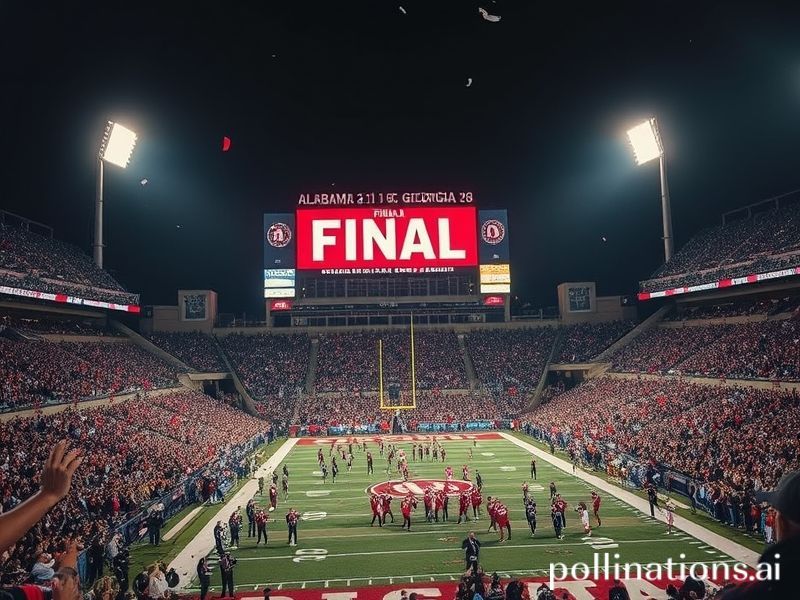Gridiron Gladiators & Global Gamblers: How NCAA Football Scores Quietly Run the World
Saturday in the American South: a region where the air is 70 % humidity, 20 % bourbon fumes, and 10 % lingering regret. While most of the planet busied itself with minor concerns such as climate tipping points and intercontinental missile tests, roughly 100,000 bipeds crammed into Bryant-Denny Stadium to watch Alabama euthanize Vanderbilt 55-3. The final score flashed on ESPN’s crawl, then ricocheted around the world faster than a UN resolution dies in committee—proof that, in 2024, American college football is the last export still manufactured entirely on-shore.
Let us pause for global context. In Singapore, traders refreshed their Bloomberg terminals between plays; the Crimson Tide’s 21-point opening quarter coincided with a 0.3 % dip in soy futures—apparently algorithmic funds now correlate SEC dominance with Midwestern crop surpluses. Across the Atlantic, a Bavarian brewmaster streaming the Georgia-Auburn slugfest on a cracked iPad realized his Märzen recipe shared the same amber hue as Kirby Smart’s visor, inspiring a limited-batch lager named “Between the Hedges.” Somewhere in Lagos, a startup founder used the Michigan-Ohio State rivalry as a metaphor in a pitch deck and walked away with Series A funding. Soft power, indeed.
The scores themselves read like casualty reports from a polite war: USC 50, Fresno State 14; Texas 38, Kansas 0; Notre Dame 48, Pitt 7—numbers delivered with the clinical detachment of a Red Cross briefing. Each rout is packaged for overseas consumption via the peculiar American art of highlight montage: brass band soundtrack, slow-motion flags, and a commentator who sounds like he’s narrating the ascent of Icarus. International audiences, conditioned to soccer’s 1-0 existential crises, can’t decide whether this is sport or a Broadway musical about Manifest Destiny.
But the real action happens off the gridiron. Consider the money laundering—sorry, “name, image, and likeness” economy—where a 19-year-old quarterback in Stillwater now earns more in endorsements than the GDP of Kiribati. The transfer portal operates with the ethics of a Swiss bank circa 1955; last week a linebacker “committed” to three different time zones before breakfast. Meanwhile, the NCAA clutches its pearls while raking in TV revenue that dwarfs the annual budget of UNESCO. Somewhere in Lausanne, an Olympic bureaucrat weeps into a Chardonnay, wondering why his quadrennial pageant can’t monetize corruption half so elegantly.
Back in the States, coaches speak of “controlling the narrative,” which loosely translates to bullying beat reporters and paying lip service to academics. Athletes major in “Sports Media” with minors in “Online Presence,” ensuring they can tweet gratitude memes in two languages—three if you count emoji. Their essays on Shakespeare are ghost-written by graduate assistants who themselves are ghost-writing dissertations on the semiotics of play-action passes. It’s a circle of life Elton John never warned us about.
And yet, the world keeps watching. Tokyo sports bars stay open until dawn to catch Pac-12 after-dark thrillers; Saudi investors, bored with soccer, now eye Clemson’s real-estate portfolio; even North Korea’s Kim Jong-un allegedly streams SEC games—strictly for tactical insights, of course. When LSU’s Jayden Daniels uncorks a 60-yard missile for six, satellites register the collective gasp from every continent except Antarctica, which remains stubbornly committed to ice hockey.
By Sunday morning, the scores are already archaeological artifacts, buried beneath NFL hysteria and looming midterms. But their residue lingers in global supply chains, foreign-policy metaphors, and the unspoken agreement that a society capable of producing such lavish excess for unpaid labor must be, on some level, winning. Sure, the oceans are boiling and the ice caps are filing for divorce, but did you see that reverse flea-flicker?
In the end, NCAA football scores are not merely statistics; they are quarterly postcards from a country that insists the apocalypse can wait until after the bowl games. The rest of us, passport stamped with cynicism, keep refreshing the feed—because if the world must end, it might as well end with a marching-band tuba player accidentally back-flipping into a flaming mascot. Roll credits.







